- Home
- Roddy Doyle
Love Page 16
Love Read online
Page 16
* * *
—
I told the neurologist.
—I keep waking up.
—Do you like a drink?
I didn’t understand. He looked too young to be asking the question.
—He’s not an alcoholic, said Faye.
—Was he drinking?
—Today?
—Yes.
—No, he wasn’t.
—Is that true? he asked me.
I looked at him.
—I was reading a book, I said.
—And last night? he said. —A party? Drinks after work?
—Are you Irish? I asked him.
—Yes, I am, he said.
—Me too.
—Yes.
I woke.
—It happened there, I told him.
—You felt you woke up again?
—Yes.
—And last night? he said.
—He was at home, said Faye. —With me. But you’re Irish, so you’ll know we’re more than likely lying when it comes to the drinking.
—Were you?
—A bottle between us, she said. —And it wasn’t empty when we turned off the television.
I was standing beside the bed.
—Put one foot in front of the other, said the neurologist. —Toe to heel.
I looked at my feet.
—Take a step now, please. Back foot to the front.
—The drink-driving test, said Faye.
—Similar.
I looked at the foot at the front.
—Take a step.
—I can’t.
—Try.
He grabbed me as I fell. He helped me sit on the bed. I looked at his hands. I woke.
—Again.
—Thank you, he said. —That’s helpful.
—It’s like a dotted line, I said. —Instead of a straight line. Dot to dot.
—Yes.
There was paper in front of me, below my eyes – a writing pad. And a pen – a biro.
—Draw a clock, please.
I held the biro. I looked at the paper.
—It doesn’t have to be perfect.
I heard Faye.
—Go on, David.
The doctor – the neurologist – was young, much younger than a specialist should have been.
I drew a circle. It wasn’t good.
—Can I draw it again?
—It’s fine.
—It’s not like a clock.
I woke up.
—I’m interested in the numbers, said the doctor.
—The hours.
—He knows his hours, don’t you, David? He’s very advanced.
I looked at Faye – I looked for Faye. She was behind me, against the window. I couldn’t see her – I couldn’t turn. I looked at the paper, at the circle that wasn’t a circle. I put the pen at the top of the circle. I didn’t know what to do.
I woke.
—Again, I said.
—Fine, he said. —The hours – do you know them?
—I think so, I told him.
I brought the biro down a bit, to the right, and wrote a 1. I had it now; I knew what to do. 2, 3, 4, 5, 6, 7, 8, 9, 10, 11.
It took hours – it seemed to be taking hours. I looked at my hand holding the biro.
I stopped. I was back at the top of the circle. I didn’t know what came next.
—David?
I woke.
I didn’t know the number.
He took the writing pad.
—Thank you, he said. —Stand up.
—Me?
—Yes.
I couldn’t. I couldn’t make myself do it. I kept waking up. He helped me stand. He didn’t have to pull. I stood. I couldn’t see the floor – I couldn’t look at it. I watched him wrap the black rubber around my arm. I saw the rubber expand, I felt it tighten.
—I’m going to take your blood pressure, he said.
—Both standing and sitting.
I felt the rubber loosen.
—It’s very low, he said.
—Okay.
—Very low. Sit now, please.
—Sorry?
—Sit down. On the bed.
I felt his hand on my arm.
—Yes, he said as I lowered myself onto the bed.
—I don’t care, I told him.
—I’m sorry?
—I don’t care.
I felt the rubber tighten, and loosen. I didn’t look at it.
—Low again, he said.
—How low? Faye asked.
—Very.
He was looking into one of my eyes. I didn’t blink.
—Who’s the President of Ireland?
—We’re in Britain, I said.
I could see him smile.
—Good man, Dave, said Faye. —Put him back in his box.
—Nevertheless, he said. —Who is he?
—I keep waking up, I said.
—And who is the President of Ireland?
I knew. I knew but I didn’t know. I knew I’d known. But nothing would come. It was like the clock – the number at the top. I didn’t know what I knew.
I waited for Faye to fill the silence. To rescue me. She didn’t.
I didn’t care.
I woke up.
—Michael D. Higgins.
* * *
—
—She’ll come round, I told Joe.
—D’you think?
—Ah, she will.
—When, though?
—I don’t know, I said. —But she will.
—Just have to be patient, I suppose, he said.
—Yeah, that’s it.
—It’s hard, though.
—Yeah.
—Fuckin’ hard.
—Must be.
—Where were we?
—Wha’?
—I was tellin’ you, he said.
—You were climbin’ over the magic wall, I said. —Go on.
—It wasn’t a fuckin’ wall.
—You used the analogy.
—Yeah, I did. But it wasn’t a wall.
—I know –. Just –. Does the knock on your head have anythin’ to do with this?
—Wha’?
—It’s a genuine question, I said.
—Okay, he said. —But it wasn’t a knock on my head. I fractured me fuckin’ skull.
—Okay.
—Fuckin’ fractured, Davy.
—Lads.
It was the barman again.
—Sorry, said Joe.
He looked at me, and smiled.
—We might get ourselves barred here, he said.
—I’d kind o’ like that, I said.
—It’d do us good. Gettin’ barred.
—Probably, yeah, I said. —Definitely.
We’d never been barred from a pub. We were reliving something else that hadn’t happened.
—But the wall, he said.
—Yeah?
—I thought I could cross an’ recross it, he said. —Although I only thought o’ the wall – tha’ film – a few minutes ago. But d’you know what I mean?
—Wha’? I said. —Like, keep two households on the go?
—No –
—A gap in the hedge?
—Would you ever fuck off, Davy.
—Why’re you sayin’ tha’?
—Right, lads – finish up. Come on.
The barman had come out from behind the counter. He was quickly standing between us, against us. He held the stools, as if he might pull them from under us.
—Are you barrin’ us? said Joe.
—If that’s what yis want to call it, said the barman.
—I don’t know yis, so just finish up and hop it – come on.
<
br /> —Thanks very much, said Joe.
He looked at me.
—There you go, Davy. We’re barred.
* * *
—
I listened.
—This one will last five minutes, said the voice. —Do you understand?
—Yes.
I was in the sausage, the scanner. I was lying down, tight against the walls of the bed – or whatever it was. The base, the shelf. My head was trapped. I couldn’t move.
I didn’t care.
I woke.
—I will be counting down from three, said the voice.
—Do you hear me?
—Yes.
They were scanning my brain. Looking for clots.
—Three –, two –.
I knew: the noise was distressing – it should have been distressing, it could have been distressing.
I woke.
This might be the last time. I thought that, exactly that. Every time I woke. This might be the last time. I didn’t care if I died. If I didn’t. I didn’t care.
* * *
—
—Can I go to the toilet first? said Joe.
The barman didn’t answer. He was a sheepdog and he’d herded the two of us through both sets of narrow doors, and out. He didn’t touch us, he didn’t say another word. He went straight back into the pub. I tried to feel amused but I couldn’t quite catch it.
—Should’ve thought o’ tha’, said Joe. —Men our age. Always go to the jacks before you get yourself thrown out of a pub.
—It’s a bit of a let-down, I said. —I expected more.
—We could smash a window, said Joe. —Do a legger.
I was going home – not home – to my father’s house. I’d have a shower, sleep, go back to the hospice. I was done. Joe’s story was inside, still at the bar. It hadn’t come out with us. I was going to shake myself away, make the decision. I didn’t care. I wanted to sleep. I didn’t want to be struggling or stupid in the morning. I wanted to sit with my father.
Joe was looking across the road, at the trees and the promenade.
—We’ll have a piss over there, he said. —Behind the pumpin’ station.
He walked across the parking spaces outside the pub, onto the road. There was no traffic – I couldn’t see or hear anything. I followed him.
—I’m goin’ now, Joe, I told him.
—We’ll go into town, he said.
—No.
—Fuckin’ yeah, Davy. Don’t desert me now.
He crossed and I followed him. We went in behind the strange structure.
—What is this?
—A pumpin’ station, said Joe. —It’s won awards.
He pissed against its side.
—Shite or water? I asked.
—Don’t know, to be honest, he said.
He groaned – he made himself groan.
—If you can piss like this – a steady stream, like. At our age. You’re grand. Your prostate’s fine.
—Did Jessica tell you tha’?
—Fuck off, he said. —Have a piss there an’ we’ll grab a taxi.
—I’m goin’ home.
—No, you’re not.
—I am.
—No, he said. —Davy. I have to tell you.
—You’ve spent all night havin’ to tell me, I said. —I still haven’t a clue wha’ happened. Except you fell over a wall.
—Come on an’ stop bein’ a cunt.
I unbuttoned my fly. The wind in the trees – the branches were alive, creaking.
—Remember we used to come down here?
—No, I said.
—We did.
—We didn’t.
—Well, I did.
—Grand.
—Hurry up, for fuck sake. Four or five taxis have gone past while you’ve been unravellin’ your langer.
I knew as I stood there, feet apart, staring at the pumping-station wall: I’d go with him. We were going to go to George’s. I wasn’t tired and I wasn’t being dragged. It was my decision. I wanted it.
We stood at the side of the road, opposite the pub.
—No fuckin’ taxis, he said.
I didn’t let myself apologise.
—It’s not too hot now.
—No, he said. —It’s grand. The way it should be. Here’s one now, look it.
A car – a taxi – was coming towards us. Joe lifted his arm.
—Here we go.
It slowed. I could see the driver, an African, looking at us. He stopped.
—Grand, said Joe. —We’re elected.
He opened the back door and got in. He kept moving across the seat, and I followed him into the car. I waited for him to say something over-friendly, faintly sardonic to the driver. But he didn’t. He told him we wanted to go to South William Street or as near as he could get us, and he thanked him. He put on his seat belt and sat back, head back, as far as he could make it go. His eyes were shut for a second, two.
—There was nothin’ tellin’ me I couldn’t – I don’t know. Balance it.
He spoke softly, just to me.
—I could be fair to both, he said. —Jess and Trish.
Jess.
That was new. It caught me on the hop. I didn’t know who he was referring to at first. She’d been Jessica all night. There was no radio on in the car. I looked out the side window. We were passing the old Clontarf Baths. The building seemed to have been converted into a restaurant; there were lights on, and two lines of parked cars outside. I said nothing about it.
—I sound like a slug, he said.
I took my eyes from the window, to look at him. He was looking at me.
—Don’t I?
—I don’t know, I told him. —I don’t know wha’ to say.
—I know, he said. —Yeah. But I think it’s true. I wasn’t actin’ the maggot, though, Davy. Or just actin’ the maggot. At all. I wasn’t. She needed me.
—Which?
—Jess.
—What d’you mean she needed you?
—I knew it. When I met her. She –. I just – I don’t know. She needed me.
—You haven’t told me about it.
—No, you’re right, he said. —I haven’t.
We were through Fairview, passing the fire station, where we’d been chased when we were walking home from the Ramones film. I didn’t remind him.
—Look, I said. —You’ve suggested it – you said it. You might have a son.
—Okay –
—And you’ve told me you’re livin’ with Jessica an’ that you’re –. Estranged?
—It’ll do.
—You’re estranged from your family.
—Yeah.
—But you’ve told me nothin’ else – not really.
—I know.
—So –
—I love her, Davy.
—Jessica?
—Yes.
—What about Trish?
—It’s different.
—For fuck sake.
—It is.
—I said it earlier, Joe. You sound like every middle-aged man who’s ever fallen for a younger woman. Except in your case the younger woman isn’t any younger. She might even be older than us, is she?
—A year.
—You’re infatuated.
—Ah, fuck off.
—Listen, I said. —I talk to one of you, some man just like you, every time I go for a few drinks after work. Which is a big reason why I never go.
—What about you?
—Wha’?
—Have you ever been fuckin’ infatuated?
—We’re not talkin’ about me.
—Go on.
—Listen, I said.
We were still speaking softly, but hissing. I could see the driver’s face in the rear-view. He was keep
ing an eye on us. We were drunk men. We were probably trying not to be, pulling ourselves back. But I was drunk and so was Joe. We were drunk men and we were right behind the driver.
—No offence, I said to Joe. —Honestly – no offence. But middle-aged men an’ the rediscovery of their spunk eyes.
I saw Joe smile.
—It’s boring, I said. —It’s really fuckin’ borin’.
—I know, he said. —I agree with you.
—I’m here, I said. —I wanted to go home, back to my da’s. I’ve had enough. But I’m here. Because you said you wanted to tell me about it.
—Okay.
—Because I was there when you met her.
—We’re buddies.
—I don’t know you, I said.
We were over Matt Talbot Bridge, turning right on to the quays.
—I can’t believe they named a bridge after Matt Talbot, I said.
—Wha’?
—He was a fuckin’ nut, I said. —With his penance an’ chains an’ feedin’ his dinner to his fuckin’ cat.
—Now you’re startin’ to do it.
—Wha’?
—Avoidin’ the subject, said Joe. —Evadin’, avoidin’. Whatever the fuck. Like tax.
—It’s just, I said. —When we were young, when we were goin’ to George’s, they were namin’ the bridges after religious fanatics. And now –. The new one back there, with the Luas tracks on it.
—The Rosie Hackett.
—Who was she?
—A union leader, he said. —I think.
—She was a member of the Irish Citizen Army, said the driver.
—Was she? Thank you.
—She was a very great lady.
—She must’ve been.
—So, there, I said. —It’s a different place.
—Not really, said Joe. —You don’t live here.
—Well, it must be, I said. —In some respects. Because you thought you could live with two different women at the same time.
—Okay –
—You thought tha’ was possible.
—That’s the thing, though, he said. —I didn’t think. Think – as in think. It wasn’t logical.
—Is he your son? I asked.
—It doesn’t matter, he said. —What I’m tryin’ to tell you. It doesn’t matter.
—It’s a shite story then, I said.
—It kind of is.
He took out his phone and looked at the clock.
—We’ll have one in the Palace.
* * *
—
It was exhaustion. I hadn’t had a stroke; there were no blood clots. Everything was fine.

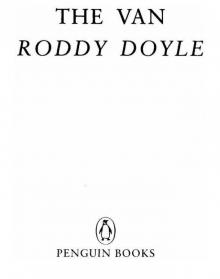 The Van
The Van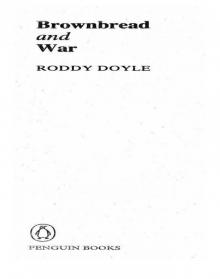 Brownbread & War
Brownbread & War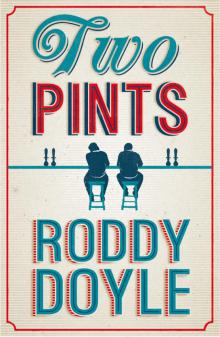 Two Pints: A Collection
Two Pints: A Collection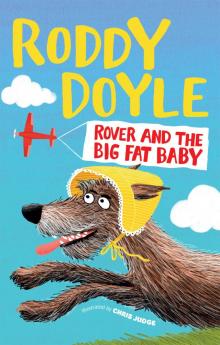 Rover and the Big Fat Baby (Giggler 4)
Rover and the Big Fat Baby (Giggler 4)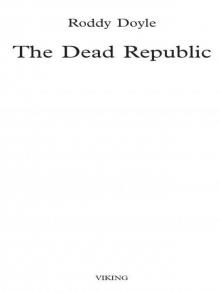 The Dead Republic
The Dead Republic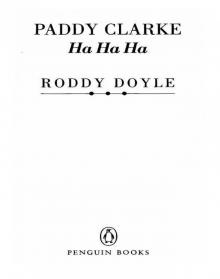 Paddy Clarke Ha Ha Ha
Paddy Clarke Ha Ha Ha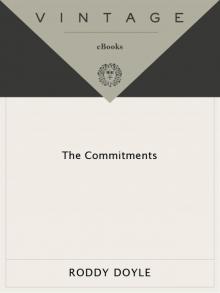 The Commitments
The Commitments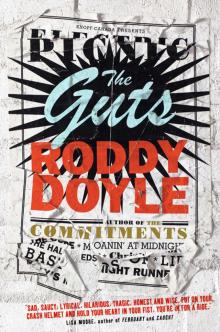 The Guts
The Guts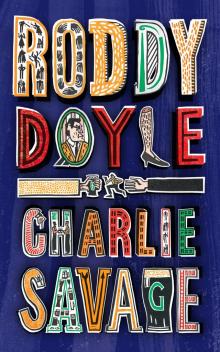 Charlie Savage
Charlie Savage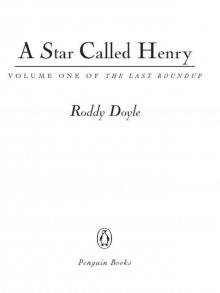 A Star Called Henry
A Star Called Henry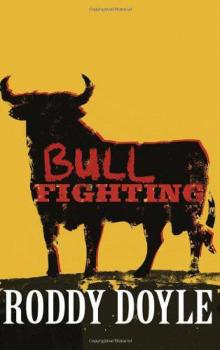 Bullfighting: Stories
Bullfighting: Stories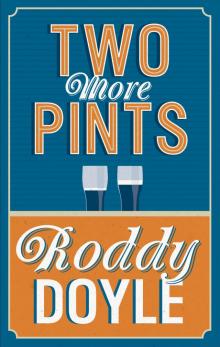 Two More Pints
Two More Pints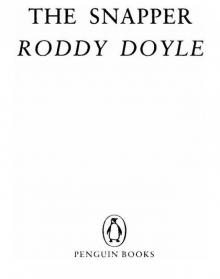 The Snapper
The Snapper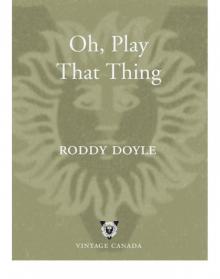 Oh, Play That Thing
Oh, Play That Thing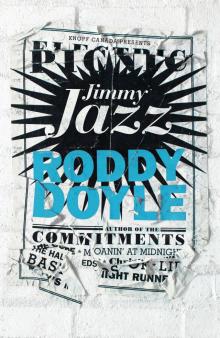 Jimmy Jazz
Jimmy Jazz Paula Spencer
Paula Spencer Wilderness
Wilderness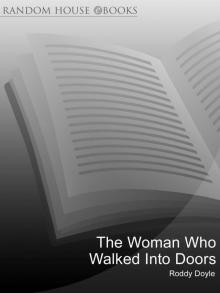 The Woman Who Walked Into Doors
The Woman Who Walked Into Doors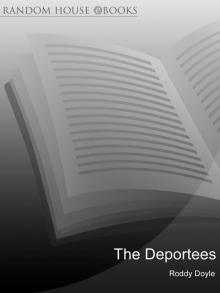 The Deportees
The Deportees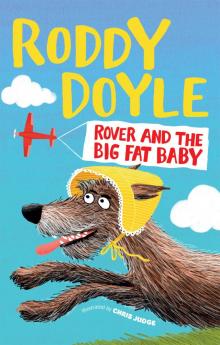 Rover and the Big Fat Baby
Rover and the Big Fat Baby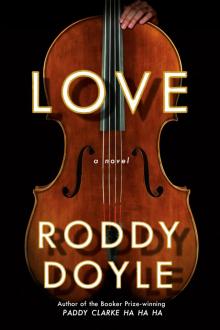 Love
Love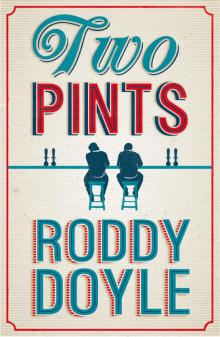 Two Pints
Two Pints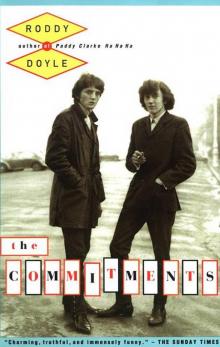 The Commitments b-1
The Commitments b-1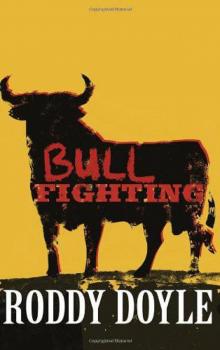 Bullfighting
Bullfighting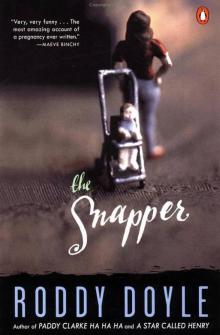 The Snapper b-2
The Snapper b-2